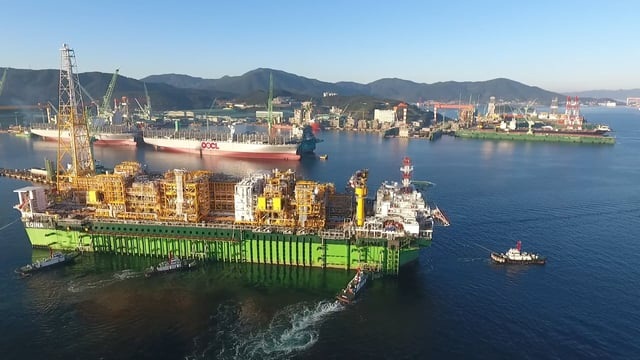
Lagos, Nigeria | AFP | Fishing boats look like specks alongside Egina, which has been moored for the last month in Lagos. Even the container ships that normally dominate the port look like small boats.
The floating production storage and offloading facility (FPSO), developed by the French group Total, looks a lot like a giant Lego set.
Everything about it is huge: its weight (220,000 tonnes), length (330 metres/1,083 feet) and width (60 metres). At 33 metres, it’s as high as a 10-storey building.
The vessel is in its final stage of construction and will soon produce some 200,000 barrels of oil a day or about 10 percent of national production.
In the next few months, Egina will head to the Niger Delta and link up to 44 subsea wells some 1,600 metres under the Gulf of Guinea.
Up to 2.3 million barrels of crude can be stored in its hull, before being taken abroad to be refined.
The cost of the project is up to $16 billion (12.8 billion euros) but according to the head of Total in Nigeria, Nicolas Terraz, the investment is justified.
“Nigeria is a very important country for Total. We’ve been here for the last 60 years,” he told AFP, looking up at the huge ship.
“It’s the biggest FPSO ever constructed by the group.”
– ‘Local content’ –
The construction of Egina in Africa for Africa may be a first but it’s not been welcomed by everyone in Nigeria’s commercial capital.
Local residents say it’s disturbed their sleep while the Egina’s sheer size has made it difficult for the yachts of amateur sailors to catch the wind in their sails.
It’s not just Egina’s size and cost that are unique: it’s the first major project to have been undertaken since a 2010 Nigerian law that made “local content” compulsory.
More than half of those involved in its construction were Nigerian and more than 75 percent of the work was done in Port Harcourt or Lagos.
The remainder was done at the Samsung shipyard in South Korea.
“We would have never thought that these things could be done locally,” said Dolapo Oni, an oil analyst with Ecobank. “It was a big gamble for Total.”
“Local companies have no access to local banks or even international funding.
“But Egina shows that there is still foreign confidence at a time when Shell or Exxon don’t invest anymore in Nigeria.”
Nigeria has suffered years of mismanagement of its resources.
 The Independent Uganda: You get the Truth we Pay the Price
The Independent Uganda: You get the Truth we Pay the Price



